Forum Home > GMAT > Quantitative > Problem Solving (PS)
Events & Promotions
| Last visit was: 27 Jul 2024, 06:54 |
It is currently 27 Jul 2024, 06:54 |

Customized
for You
Track
Your Progress
Practice
Pays
09:55 AM PDT
-11:00 AM PDT
08:00 PM PDT
-09:00 PM PDT
05:55 AM PDT
-12:30 PM PDT
07:00 PM IST
-08:00 PM IST
09:00 PM IST
-10:00 PM IST
| FROM Stacy Blackman Consulting Blog: Tuesday Tips: HEC Paris Essays and Tips for 2022-2023 |
 HEC Paris essays focus on your ethics and values. A fantastic location in Paris and a robust leadership education distinguish the HEC MBA. HEC Paris boasts a high number of CEOs in its alumni community. Another distinction is an entrepreneurial spirit. HEC Paris consistently ranks as one of the top MBA programs in the world. If your life and career are based in Europe, HEC is worth a closer look. And, even if you are primarily United States-based, consider adding a European MBA program to your list. Don’t hesitate to contact us to learn more about how Stacy Blackman Consulting can help with your HEC Paris essays. For more details on the HEC Paris essays and application requirements, visit the HEC Paris website. HEC Paris Essays Essay 1: Why are you applying to the HEC MBA Program now? What is the professional objective that will guide your career choice after your MBA, and how will the HEC MBA contribute to the achievement of this objective? (500 words max.) Describing your career goals is the first task in this HEC Paris essay. Also, why now is the right time for an MBA, and why HEC Paris is your choice. Also, you will want to explain past experiences, but avoid reciting your resume. In addition, think about the critical moments in your career that can highlight your skills. Focus on some mini-stories to tell. Then, you can explain your career choice with specifics. Within which industry do you want to work? What will be your function (marketing or finance, for example)? Do you have any desires for location and aspirations to impact the global economy? HEC Paris has successfully assisted its students with career changes and entrepreneurial dreams. If you are looking for a new career after your MBA, HEC may be the perfect place. Thorough school research will help you make the case to the admissions committee. Also, you should explain the classes, professors, and student activities that will help you achieve your goals.  Essay 2: What do you consider your most significant life achievement? (250 words max.) HEC Paris is looking for leaders. In the second of the HEC Paris essays, describe an experience demonstrating leadership. Consider that there is no time limit to this essay. For instance, you could explore something formative that happened to you as a teenager or an achievement from last week. Also, consider an accomplishment that demonstrates who you are when selecting an example. It should showcase a moment that changed the course of your life. For example, perhaps you were given an assignment at work that was beyond your capabilities. That experience may have taught you how to leverage the expertise of a team. Or, it may have forced you to research and learn on your own. Think about the achievements that stretched your abilities and taught you the most. A leadership example can also show how you helped a team achieve its best work. Essay 3: Leadership and ethics are inevitably intertwined in the business world. Describe a situation in which you have dealt with these issues and how they have influenced you. (250 words max.) Because ethics are so important, the third in this set of HEC Paris essays focuses on this issue. As a future leader, ethics can determine how well your company performs. When you look at the devastating results of the 2008 financial crisis, or recent security breaches at major tech companies, it is clear that ethics can influence business. You have likely encountered colleagues or leaders who did not adhere to ethical behavior during your career. When you have come across a moral dilemma, how did you handle it? Explain the situation, how you felt, what you did, and the outcome. Ideally, you have learned a lesson as a result of the experience. Finally, consider your overall approach to leadership and ethics. Essay 4: Imagine a life entirely different from the one you now lead. What would it be? (250 words max.) This HEC Paris essay is a creative way to explore your character and core personality. When you think about the opposite of who you are today, it shows how you view yourself. Where would a person leading an entirely different life live? What career would they pursue? What would be their family responsibilities? Ask your friends and family what they think as a thought starter. Describe this alternative life with as many specifics as possible, and use the exercise to clarify your core values.  Essay 5: Please choose from one of the following essays, 250 words max.: a) What monument or site would you advise a first-time visitor to your country or city to discover, and why? b) Certain books, movies, or plays have had an international success that you believe undeserved. Choose an example and analyze it. c) What figure do you most admire and why? You may choose from any field (arts, literature, politics, business, etc.) Of all the HEC Paris essays, this one provides options to share your strong opinions and personality with the admissions committee. For instance, you can choose to describe your country or city, discuss an art piece, or a leader you admire. Honestly, any of the choices can showcase an aspect of your personality. Overall, the goal is to differentiate yourself. Consider the best option for your unique background. For example, if you live in a small country or city rarely visited by tourists, describe a monument or site. In this way, using the essay to describe your city or country can further explain your background. On the other hand, if you choose a public figure you admire, you could explore your leadership ideas. Or, perhaps you admire persistence, overcoming obstacles, or helping others. Use those ideas to explore your core values. Finally, whichever option you choose, get personal! Essay 6 (Optional): Is there any additional information you would like to share with us? (900 words max.) This HEC Paris essay gives you space to describe any additional information you would like to provide to the admissions committee. Generally, optional essays are for any confusing or concerning information in your application. In this case, you may also use this essay to provide positive details. You may have a story about leadership or another achievement you would like to highlight. If so, this is a place to tell that story. If you have described your core values in any of the above, you may be able to reinforce that story with this essay. This is the essay to use if you need to explain an academic issue, low GMAT, recommender issue, or gap in work experience. It is far better to clarify any problems in your application than to leave the admissions committee to guess what happened. Briefly explain your issue and focus most of the essay on the correction employed. For example, if you had a low grade in a quantitative course in college, spend most of the essay describing how you have shown academic promise since then, rather than focusing on the negative. Avoid blaming anyone else for your issue. Instead, explain why this one incident is in your past and will stay there. You may skip this essay if you do not have another story to tell or an incident in the past to explain. Remember that it is optional. *** We have helped countless applicants achieve their MBA dreams. Contact us to learn how Stacy Blackman Consulting can help with your MBA applications this season. The post Tuesday Tips: HEC Paris Essays and Tips for 2022-2023 appeared first on Stacy Blackman Consulting - MBA Admissions Consulting. |
| FROM Stacy Blackman Consulting Blog: B-Schooled Podcast Episode #125: Things You’re Scared to Talk About (and Why You Really Should) Part 1 |
 In this episode of B-Schooled, SBC consultant Caryn Altman joins us for some real talk. Today’s topic: the complicated question of sharing something in your application of which you are not proud. This might be explaining anything you wish you’d handled differently… from a low GPA to a lapse in judgment to something like a DUI. The key to approaching these topics effectively is often LESS about the incident itself and much MORE about how you respond to and explain the topic in your application. Admissions officers want to understand how you handled the situation, what you learned from the experience, and/or how you have grown and changed. The first in a series of two podcasts, this episode will cover how to address: • A low GMAT/GRE score • A mistake you made or something you regret (such as a DUI or an honor code violation) • The need to *stand out* from the crowd (especially if you come from an overrepresented demographic) To be clear, this conversation is not just for people who’ve encountered these specific situations. The real takeaways from this episode focus not on the situation but on an approach. And–let’s face it–who doesn’t have at least one part of their application they are nervous about? Caryn worked as an Admissions Officer for the Kellogg School of Management, where she read and evaluated countless MBA applications. She also holds an MBA from Kellogg and has been a longtime admissions consultant with SBC. Make sure to come back next week for the second half of our illuminating conversation. This B-Schooled episode can be found here, or take a listen on any of the major podcast platforms below. B-Schooled is available on most major podcast apps, including: Apple Podcasts Spotify Stitcher TuneIn Please be sure to subscribe to B-Schooled so that you don’t miss a thing. Also, if there’s something you’d like for us to cover in a future episode, please email podcast@stacyblackman.com. We’d love to hear from you! The post B-Schooled Podcast Episode #125: Things You’re Scared to Talk About (and Why You Really Should) Part 1 appeared first on Stacy Blackman Consulting - MBA Admissions Consulting. |
| FROM Stacy Blackman Consulting Blog: Evaluating Your MBA Candidacy from the AdCom’s Perspective |
 Every year, we hear of MBA admissions offers going to Olympic athletes, NASA scientists, and former White House aides. While these profiles grab the headlines, they can discourage candidates without a flashy personal or professional story. Business school applicants can’t help but fret over what their target MBA programs want to see in a candidate. In truth, the admissions committee focuses on four specific areas when evaluating your MBA candidacy. The welcome news for applicants of all stripes is that standing out in these aspects can happen no matter where you’ve worked or your background. 4 Considerations When Evaluating Your MBA Candidacy Work Experience and Professional Goals The admissions committee generally likes applicants to have three or more years of work experience before applying. But the quality of the overall experience matters much more length of time. Have you worked within flat organizational structures where you’ve had the same title for years? You can still differentiate yourself by highlighting substantial professional growth and quantifiable achievements. Or by showing examples when you embraced new challenges and took advantage of learning opportunities. Whether your pre-MBA experience is at Goldman Sachs or your family’s business, the admissions team will look for steady progression. Business school is the ideal place to refine your career goals by studying new disciplines, having discussions with students and professors, and pursuing entrepreneurial projects. That said, you do have to make some choices and explain your areas of interest to get admitted. Make sure to include a definite role you envision for yourself in the future. Explain the impact you want to have in the business world and society. Successful essays won’t include the statement, “I look forward to figuring out my future career path in business school.” Finally, remember to convey realistic post-MBA career goals. Consider the application process from the school’s perspective. MBA programs want to launch graduates who will become successful in their careers. Grads also serve as vibrant members of the alumni community. Don’t forget to sell them on your employability. The admissions team should feel confident you’ll find a great job quickly upon graduating. Leadership Business schools strive to create the leaders of tomorrow. The admissions committee wants to see that you already have a framework in this all-important area. Many applicants worry about how the admissions team will perceive their leadership skills if they’ve never actually held a management position. However, your leadership examples don’t need to be your most extraordinary life or professional achievements. Applicants can call upon times when they’ve led sports teams, student groups, etc.  Successful leadership examples should show how you motivated other people. Did you bring out their passions? Or did you educate and help them see organizational priorities in new ways? The work of a leader energizes or improves the work of others. Find anecdotes from your professional and extracurricular background that illustrate this behavior. Define the leadership challenges you faced, not the management ones. Collecting impressive titles does not make someone a great leader. However, helping a team overcome significant challenges does. When evaluating your MBA candidacy, remember that in the adcomm’s view, your past is a strong predictor of how involved you’ll be on campus if admitted. Ultimately, leadership examples from college, on the job, and your time at business school signal future employers how you would perform in their organization. Creativity and Intellectual Aptitude When some Type-A personalities see the word creativity in this context, they freak out and assume we’re talking about something artistic. But we’re referring to expressing creativity by showing when you have solved problems at work or in your volunteer activities by thinking outside of the proverbial box.  Some business schools use creative MBA essay prompts. Think Duke Fuqua’s 25 Random Things About Yourself. Or the cover letter and video statement at MIT Sloan School of Management. When evaluating your MBA candidacy, admissions teams will look for evidence in responses that show you have a unique perspective that will add something new to the classroom. So, think beyond your apparent achievements. You can differentiate yourself by highlighting the most compelling, memorable stories and experiences. Intellectual aptitude, meanwhile, will be judged based on your submitted GMAT or GRE scores as well as your undergraduate GPA and major. A solid 3.2 overall GPA from an Economics or Chemistry major will weigh more heavily than a 3.8 GPA in the Arts or Humanities. However, admissions committees actively seek a diverse class that includes those so-called “poets of b-school.” That’s where a strong GMAT score or taking additional college-level math courses that prove you can handle the academic rigors of the program comes in. Interpersonal Skills and Fit The admissions process at many business schools now includes video essays, team-based discussions, and group interviews. These additions ensure the applicant has the appropriate interpersonal skills for success and will fit well with the program’s culture.  Business schools want students who will play nice with others. Watching how someone interacts with peers before anyone gets admitted can be very telling. Your application and interview should support those individual attributes that make you a great candidate and person overall. They should reveal your understanding of the school’s culture. Finally, they must convey that you will be a terrific fit if admitted. At some schools, fit and knowledge of the program matter as much as concrete qualifications when evaluating your MBA candidacy. Of course, you still need to have those qualifications. But without a complete understanding of the many terrific facets of the school, you could find yourself on the rejected applicant pile. Round one application deadlines are now upon us. By evaluating your MBA candidacy in these four areas, you’ll boost your chances of making it to the interview stage and beyond. photo credit: Solent Creatives (CC BY 2.0) The post Evaluating Your MBA Candidacy from the AdCom’s Perspective appeared first on Stacy Blackman Consulting - MBA Admissions Consulting. |
| FROM Stacy Blackman Consulting Blog: Get Better at Setting Goals |
 “FRESH IDEAS FROM THE BLACKLIGHT” SBC’s Weekly Newsletter for Professionals We can all appreciate the value of setting goals in our professional and personal lives. Yet we also know our aspirations often bite the dust. (We’re looking at you, 2022 New Year’s resolutions.) To increase your odds of achieving your targets, it’s time to go beyond the classic SMART goals strategy. Widely embraced in corporate America, SMART stands for:
 “What we know is from research into New Year’s resolutions and just any goals that get set, very few—less than 10% of people—come even close to reaching their goals,” Wortmann says. He explains that people forget to consider three things when setting goals: tools, support, and a stop button. Let’s take a closer look at these crucial elements. Tools. “To maximize their likelihood of success, goal-setters should consider what tools they will need,” Pavin says. “These are the tangible things that will enable them to achieve their goals.” For instance, say you aim to develop your programming skills further. Joining an online community for programmers is one tool to achieve that. If your goal is to improve your public speaking, the local Toastmasters club is a perfect tool. Another underused tool for goal setting is the premortem. By mapping out potential roadblocks to reaching your goal, you can develop strategies for dealing with setbacks.  Many people neglect the most straightforward yet valuable tool to reach their goal: a calendar. To Wortmann’s surprise, senior people often resist putting time blocks in their calendars to work toward their goals. “And without that simple tool…they are putting a hurdle in front of that goal before they even start,” Pavin notes. Support. A manager can encourage your goal setting, but Wortman thinks of support more like coaching. “Turns out, you shouldn’t have just one coach. You should have multiple coaches,” he says. Rather than rely on one person to meet multiple needs, consider this. Are they the best person for the support you require? Or, are they overstretched? As this piece in Harvard Business Review points out, by diversifying your mentors, you can “find the right people to help you navigate the problems they are uniquely well-suited to solve.”  “You may even consider having coaches in your life–like family members–who do nothing but hold you accountable for working toward your goal,” Pavin adds. A stop button. “A lot of people who set goals are already ambitious people with a lot already on their plate,” Pavin says. “Everything that currently fills their day feels essential. So, they just try to just cram one more thing in, which is a recipe for failure.” The final element most people overlook is not employing a stop button. When coaching executives on how they can achieve their goals, Wortmann first ensures they find the tools and support they need. But then comes the bigger question: What will you eliminate from your schedule to make that happen?  “We all have the same time. It’s a question of priority,” Wortmann says. “It’s great that you want to increase your sales by 20%. What are you going to stop doing in order to achieve that?” Reflect on how you spend your day, and you’ll likely find some activities that are lower priority than your goal. “This is what is so powerful about Stop,” Pavin says. “You can’t just manufacture more time, but you can reprioritize to make the goals the things you spend time on.” Huzzah! You made it to the end of the post! This post on strategies for setting goals appeared initially in the Blacklight, our weekly newsletter for professionals. At the Blacklight, we aim to illuminate with every dispatch that lands in your inbox. If you’re thirsty for guidance to help you slay it at work or as a student and move your goalposts closer, sign up today! The post Get Better at Setting Goals appeared first on Stacy Blackman Consulting - MBA Admissions Consulting. |
| FROM Stacy Blackman Consulting Blog: Tuesday Tips: USC Marshall Application Essays, Tips for 2022-2023 |
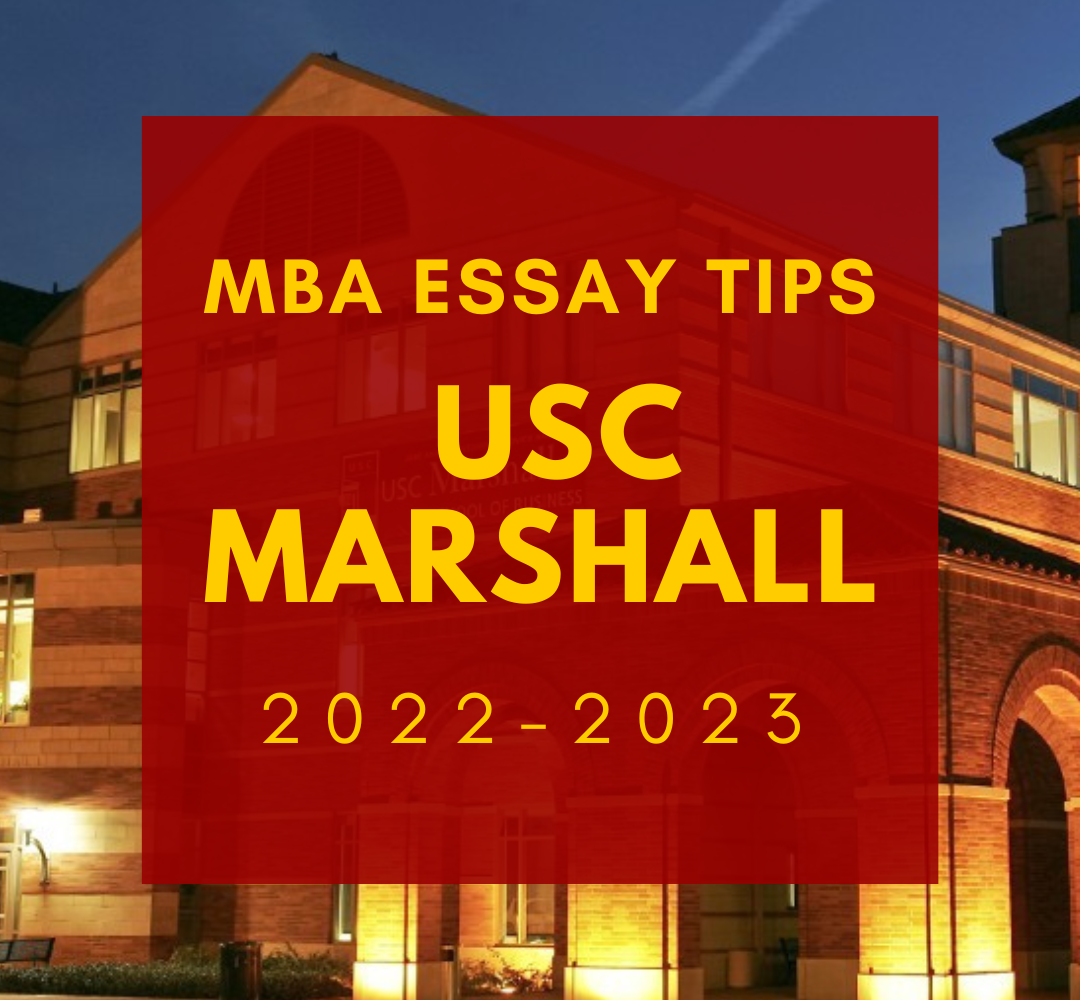 The USC Marshall School of Business reflects the diversity and dynamism of the Los Angeles area. These USC Marshall application essays allow you the space to express how you will fit into the community. Though Marshall is a community of its own, the larger USC Trojan Family is an integral part of the school’s identity and offers additional academic opportunities for MBA students. “At Marshall, our focus is on producing leaders with the skills to turn ideas into outcomes for the real world, right now,” says Dean Geoffrey Garrett. “Our award-winning faculty thought leadership and experiential learning environment creates leaders who are visionary and adaptable; prepared not only for the jobs of today, but also for future careers not yet imagined that the Marshall community will help shape.” Because community is so vital to this USC Marshall application, the admissions office wants to know who you are as a person. As such, the AdCom team doesn’t subscribe to the concept of the “perfect” or “ideal” candidate. Everyone has a unique story. As you prepare your USC Marshall application, make sure to do your research. Remember to include talking to current and former students so that you can better understand the culture in depth. To learn more about the program, visit the USC Marshall website. Need help with your USC Marshall application strategy? Contact us to learn more about what SBC can do for you. Essay #1 (Required) What is your specific, immediate short-term career goal upon completion of your MBA? Please include an intended position, function, and industry in your response. (word limit: 100) With only 100 words to use here, stay brief, and focused in this USC application essay. Consider your plan when you graduate from USC. And make sure your resume and other application materials support this next step. For example, if you are career switching, highlight any transferable skills in your resume. Another idea is to ask your recommenders to comment on your future plans. Further, as you craft all of these strategies, make sure you highlight how you will use your MBA to reach your goals. What if your next job is a logical step from your prior experience to your MBA? Even if you think it’s obvious, it’s essential to be specific about your career goals. Describe the job you plan to pursue with as much detail as possible.  Essay #2 (Required) Please draft a letter that begins with “Dear Admissions Committee” (word limit: 600) This letter serves as your personal statement that provides the Admissions Committee with an understanding of your candidacy for Marshall beyond what is evident in other parts of your application. This essay is purposely open-ended. You are free to express yourself in whatever way you see fit. The goal is to have an appreciation for and an understanding of each candidate in ways that are not captured by test scores, grades, and resumes. Showing who you are as a person is essential to your USC Marshall application. Ideally, you can demonstrate that you understand the USC culture and values with your answer to this essay question. First, start with your statistics and data. USC Marshall will see your GPA, your test scores, and your transcripts. Second, the admissions committee will see your career progress on your resume. Third, you will add some personal color to your application through the recommendation letters. These elements should show that you have leadership potential, academic promise, and a well-rounded personality. This essay is the place to fill any gaps.  Consider what you need to communicate to show all sides of your candidacy in this USC application essay. For example, if you are someone who has a standard career history, you might describe something interesting in your background. Perhaps you have an unusual hobby, have made an impact on the community, or have a unique family heritage. Another aspect of your USC Marshall application that may not appear in your data is your passion for learning. For instance, if there is a professor you would want to work with, this question is an opportunity to discuss their work. Similarly, you may want to join or lead a club or community effort that isn’t obvious from the other data you submit. Essay #3 (Optional) Please provide any additional information you would like the admissions committee to consider. (word limit: 250) This USC application essay offers an opportunity to add more information or to discuss a concern. Therefore, if you have a low GPA, a grade below a C in a quantitative subject, an employment gap, or any other issue in your background, this is the place to explain it. However, if you want to highlight anything else about your career path, experience, or personal background, this essay allows you the space to do so. And, if you need to explain an area of concern, clearly explain what happened, and what you have done to improve or address the issue. Focus on the future in a positive manner to leave the strongest impression. The post Tuesday Tips: USC Marshall Application Essays, Tips for 2022-2023 appeared first on Stacy Blackman Consulting - MBA Admissions Consulting. |
| FROM Stacy Blackman Consulting Blog: B-Schooled Podcast Episode #126: Things You’re Scared to Talk About (and Why You Really Should) Part 2 |
|
[img]https://www.stacyblackman.com/wp-content/uploads/B-Schooled-swoosh-navy-FINAL-DESIGN-734x734.jpg[/img] In this new episode of B-Schooled, Caryn Altman rejoins us for more real talk. Today’s topic: the complicated question of sharing something in your application of which you are not proud. This might mean explaining anything you wish you’d handled differently… from a low GPA to a lapse in judgment to something like a DUI. The key to approaching these topics effectively is often LESS about the incident itself and much MORE about how you respond to and explain the topic in your application. Admissions officers want to understand how you handled the situation, what you learned from the experience, and/or how you have grown and changed. In [url=https://www.stacyblackman.com/blog/b-schooled-podcast-episode-125-things-youre-scared-to-talk-about-and-why-you-really-should-part-1/]last week’s episode[/url], we discussed: • A low GMAT • A mistake you made or something you regret (such as a DUI or an honor code violation) • The need to *stand out* from the crowd (especially if you come from an overrepresented demographic) [b]And this week, we will tackle three additional topics with even more candor:[/b] • Failing grades or low GPA • Being a candidate that is significantly “older” or “younger” than other applicants • A sneaking suspicion that your school selection is way out of reach To be clear, this conversation is not just for people who’ve encountered these specific situations. The real takeaways from this episode focus not on the situation but an approach. And–let’s face it–who doesn’t have at least one part of their application they are nervous about? Our special guest Caryn Altman worked as an Admissions Officer for the Kellogg School of Management, where she read and evaluated countless applications. Caryn also holds an MBA from Kellogg and has been a longtime admissions consultant with SBC. This B-Schooled episode can be found here, or take a listen on any of the major podcast platforms below. B-Schooled is available on most major podcast apps, including: [url=https://podcasts.apple.com/us/podcast/b-schooled/id1510478621]Apple Podcasts[/url] [url=https://open.spotify.com/show/4jw7gkYqwToVeNN47oPu3u]Spotify[/url] [url=https://www.stitcher.com/show/bschooled]Stitcher[/url] [url=https://tunein.com/podcasts/Education-Podcasts/B-Schooled-p1319978/]TuneIn[/url] Please be sure to subscribe to B-Schooled so that you don’t miss a thing. Also, if there’s something you’d like for us to cover in a future episode, please email [email=podcast@stacyblackman.com]podcast@stacyblackman.com[/email]. We’d love to hear from you! The post [url=https://www.stacyblackman.com/blog/b-schooled-podcast-episode-126-things-youre-scared-to-talk-about-and-why-you-really-should-part-2/]B-Schooled Podcast Episode #126: Things You’re Scared to Talk About (and Why You Really Should) Part 2[/url] appeared first on [url=https://www.stacyblackman.com]Stacy Blackman Consulting - MBA Admissions Consulting[/url]. |
| FROM Stacy Blackman Consulting Blog: Show Why You Need an MBA |
 There’s much to think about when you’re pulling together your business school application materials. You’ve got to ensure your MBA resume is in top shape, that your recommenders will upload their letters on time, that your essays are compelling and will position you well—the list goes on. One thing often overlooked is communicating to the AdCom why you need an MBA in the first place. Have you taken time to think through this? If going back to school has always been your plan, the application process could turn into a mere box-ticking exercise. You might get so focused on impressing the AdCom that you fail to explain how their program can help you. We’re not talking about the “Why school X?” responses. That’s where you show you’ve thoroughly researched a program by mentioning classes, professors, clubs, etc. in your essays. We mean explaining what you still need to learn and what experience you must gain to reach your career goals. If you don’t say why you need an MBA while highlighting your background, achievements, and career aspirations, the AdCom may decide that someone else would benefit more from their program. So, don’t be afraid to point out your skills gaps and exactly how an MBA can help. The AdCom isn’t looking to put together a class of people who are already perfect and have nothing to learn from each other! Think of it this way: if he could admit it, you can, too. 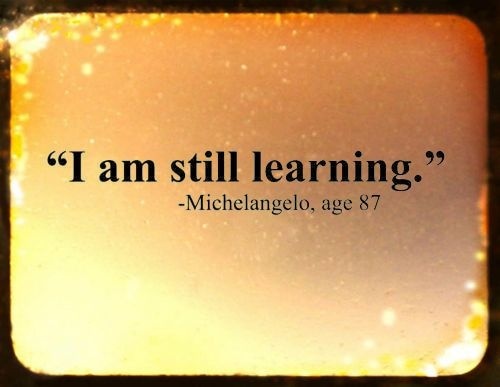 *** Do you want to stay on top of the application process with timely tips like these? Please subscribe to our weekly newsletter and you’ll receive our expert advice straight in your mailbox before it appears on the blog, plus special offers, promotions, discounts, invitations to events, and more. The post Show Why You Need an MBA appeared first on Stacy Blackman Consulting - MBA Admissions Consulting. |
| FROM Stacy Blackman Consulting Blog: Tuesday Tips: Oxford MBA Application Essay Tips for 2022-2023 |
 Are you currently working on your Oxford MBA application? The highly ranked one-year Saïd at Oxford MBA program exposes students to an international, diverse network at a world-class institution. For that reason, Oxford seeks engaged students and mature leaders with extensive work experience. In addition to attending virtual information sessions and visiting the school, a great way to learn about the Oxford MBA is by reading student blogs. You’ll notice that there is a strong culture of improving the world. In fact, this emphasis on making the world a better place comes through clearly in this set of Oxford MBA application essays. Conveying your deeper purpose is a core motivator for a successful applicant. Above all, Oxford states, “the admissions committee will be looking for evidence of the following: good communication skills, leadership potential, analytical skills, fit with the Oxford MBA community.” To learn more, visit the Oxford Saïd website. For assistance with your application essays, contact Stacy Blackman Consulting for a complimentary evaluation.  The Oxford MBA Application Supporting Statement: Tell us something that is not covered in your application which you would like the Admissions Committee to know about you. (Maximum 250 words) This Oxford MBA application essay is open-ended. Therefore, it allows you to cover almost any topic that you think needs more clarification. Perhaps you want to describe something about your personal background. On the other hand, you might want to describe a leadership role in a volunteer role. In addition, it’s possible to use this essay to further emphasize your career goals. Consider sharing information about your international experience if applicable. Oxford is looking for maturity, leadership, and diversity in applicants. Accordingly, this essay is an opportunity to show these qualities. Once you have chosen a topic for this Oxford MBA application essay, you will want to explain yourself clearly. With only 250 words, you should make sure to use precise language and examples. Specific examples will help the admissions committee understand you better. For example, you might describe a volunteer accomplishment. To do so, describe who was there, what you accomplished, and how you felt about it. If you are applying under the Oxford 1+1 MBA scheme, you also need to submit the following essay: Explain why you see this as particularly beneficial for you and how it fits with your career and personal development aims. (Maximum 250 words) The Oxford 1+1 MBA provides a unique experience. You can study business for one year and spend the other year studying topics from African Studies to Water Science, Policy, and Management. 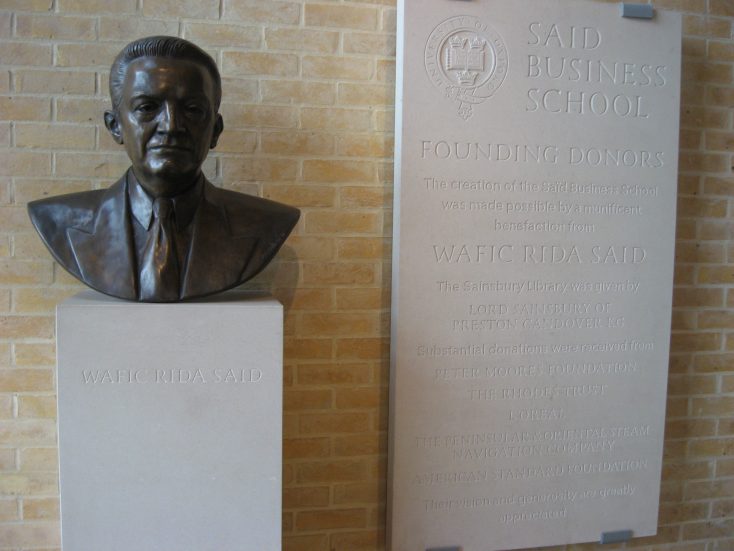 Successful applicants will show why they have a good reason to study both. Consider your career goals and how a well-rounded course may help you. In addition, focus on long-term goals and consider how deep knowledge in a master’s topic could provide perspective. This Oxford MBA application essay is asking “Why 1+1,” and you will need a clear answer. Therefore, extensive program research will help you answer the question thoroughly. To conduct your research, consider contacting current or former students, as well as alumni or faculty. Make sure you have well-researched questions to ask of them and focus on your interests and goals. Re-applicants will need to submit an additional essay as below: What improvements have you made in your candidacy since you last applied to the Oxford MBA? (Maximum 250 words) It’s easy to answer questions like this one when you have improved scores. However, even if your improvements are less tangible, this essay allows you to express them. First, consider what you have learned since you last applied. Second, think about any advancements at work. Third, review your outside activities for any leadership experiences. Once you have reviewed the recent developments, describe them briefly in this essay. Finally, make sure to explain why you are a stronger candidate. The post Tuesday Tips: Oxford MBA Application Essay Tips for 2022-2023 appeared first on Stacy Blackman Consulting - MBA Admissions Consulting. |
| FROM Stacy Blackman Consulting Blog: B-Schooled Podcast Episode #127: How to Pick the Right Recommenders |
 It’s time for Round 2 MBA applicants to start getting serious about their letters of recommendation! Some admissions committees have said that rec. letters are the single most important aspect of your MBA application, so choose wisely. This episode of B-Schooled will help you decide who to ask, as well as help you understand: • The most important recommender criteria • What you should do if you can’t ask your direct manager for a letter • What you should do if you don’t want anyone at your company to know of your MBA plans • If it’s OK to use college professors or extracurricular contacts as recommenders • Whether seniority or alumni status matters • Whether “side letters” are effective • What you should do if you’ve worked for more than one company since college • What you should do if you haven’t worked with one of your recommenders for some time, and finally • What you should do if you work for a family-owned business Listen to B-Schooled episode #127 here or on any of the podcast apps listed below. B-Schooled is available on most major podcast apps, including: Apple Podcasts Spotify Stitcher TuneIn Please be sure to subscribe to B-Schooled so that you don’t miss a thing. Also, if there’s something you’d like for us to cover in a future episode, please email podcast@stacyblackman.com. We’d love to hear from you! The post B-Schooled Podcast Episode #127: How to Pick the Right Recommenders appeared first on Stacy Blackman Consulting - MBA Admissions Consulting. |
| FROM Stacy Blackman Consulting Blog: AdCom Shakeup at HBS, Stanford GSB |
Two resignation announcements at two of the world’s top business schools have left MBA industry folks buzzing. Both Chad Losee of Harvard Business School and Kirsten Moss of Stanford Graduate School of Business shared their departure plans on September 28. “Harvard Business School has changed my life. I distinctly remember being in your shoes applying to business schools, now about 12 years ago,” Losee wrote in an update on HBS’s Direct from the Director blog. “I will always be grateful to have been admitted to and subsequently transformed by HBS, first as a student and now as a member of the team.” Losee concludes his 6+ year tenure as head of admissions and financial aid with several key milestones under his belt. Weathering the pandemic meant adjusting class enrollment from a historically small 730 students in 2020 to 1,015 students in the inflated Class of 2024, due to covid-era deferrals. In addition, Losee and the admissions team recently announced a history-making financial aid pledge to students with the greatest economic need. Roughly ten percent of students qualify for full-tuition scholarships, which will cover $76,000 in tuition and course fees for each year of the two-year program. “I have always felt that one of the humbling honors of our work is getting to know you and feeling inspired by your potential to make a difference in the world,” Losee said to applicants in his closing remarks. “Even with all the challenges today, you give us all a sense of optimism about the future.” Losee’s next stop is Yale University, where he will serve as head of strategy in the university’s provost’s office. The GSB Gatekeeper Heads for the Door  While her future plans have not yet been shared, Kirsten Moss leaves Stanford’s admissions team in an enviably strong position. The GSB regularly ranks as the best business school in the world across a variety of media outlets. Under Moss’s stewardship, the school has also seen record-setting enrollment of women, under-represented minorities, and international and first-generation students. In the school’s announcement, Paul Oyer, senior associate dean for academic affairs, said Moss was dedicated to “democratizing the application process to redesigning our financial aid process and leading efforts to advance racial equity in MBA admissions.” “I am incredibly proud of the work that the MBA Admissions and Financial Aid team has done to attract, select, and enroll exceptional leaders,” Moss said in the statement. “We have been committed to helping individuals from all backgrounds see their capability and believe in their potential to lead.” Like Losee, Moss will step down at the end of 2022. Stanford announced it has already begun a global search for her successor. The post AdCom Shakeup at HBS, Stanford GSB appeared first on Stacy Blackman Consulting - MBA Admissions Consulting. |
| FROM Stacy Blackman Consulting Blog: Sell Yourself With an MBA Resume |
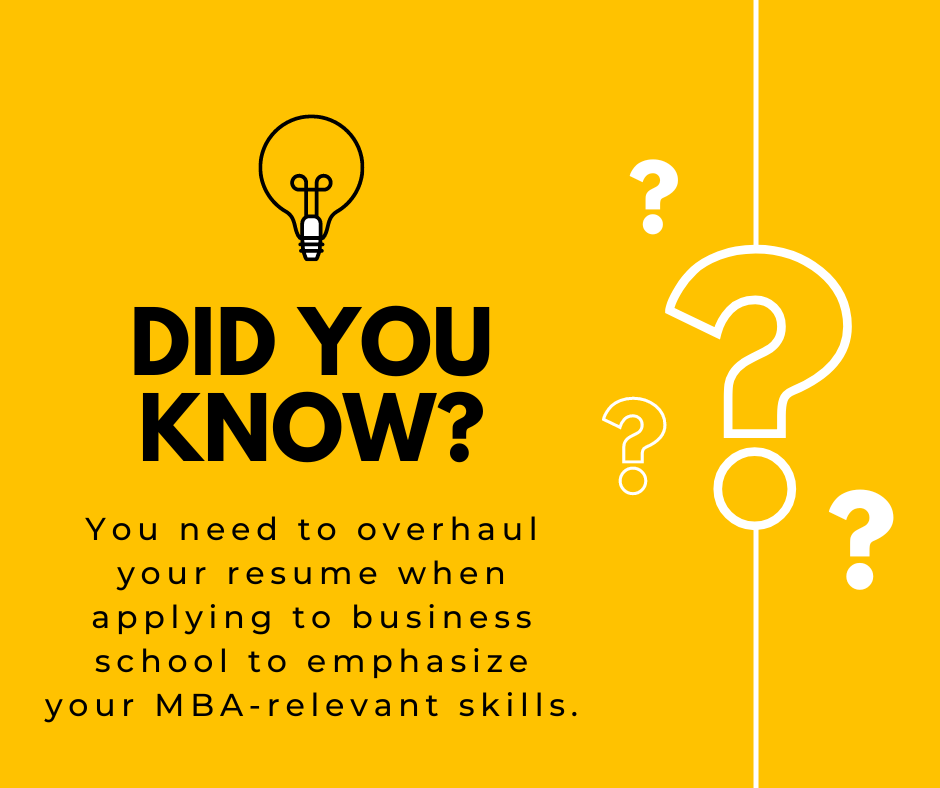 The MBA resume is a whole other animal from the standard curriculum vitae designed to land you a job. Instead, the resume you tailor specifically for business schools should offer a quick snapshot of your significant work experiences and accomplishments in three areas that showcase your MBA-relevant skills. Leadership Business schools want to see applicants who already have strong leadership skills. Of course, you’ll further groom your management abilities during your MBA program. But the admissions committee wants to know that the foundation is already there. Give evidence of when you:
 Our client George worried because he didn’t have a title change throughout his four years at a defense contracting company. Because he worked as an engineer, raises rather than a new title denoted the increase in his responsibilities. We looked at what George did outside of work to see where he could highlight a leadership role. George had participated in an annual charity bike ride for the past five years, so we suggested that he volunteer to coordinate the next ride. The event became this bullet point on his resume: “Led annual bike ride to raise money in support of autistic children. Recruited volunteers, coordinated vendors and managed finances. Resulted in 14% increase in revenue over prior year.” This brief, compelling example showcased his leadership abilities, emotional intelligence, and service to the community—a winning trifecta every time. (Check out B-Schooled Podcast Episode #16: How to MBA Your Resume) Display Your Top-Notch Communication Skills Today’s tech-native generation of applicants is as comfortable texting, tweeting, and Snapchatting as they are breathing. Consequently, recruiters often gripe about the mediocre writing and speaking skills of newly minted MBAs. Your MBA resume is prime real estate for showcasing savvy communication skills through crisp writing and well-chosen words. You can make even the most mundane tasks shine as you bullet-point your professional accomplishments. A real example of a blah bullet point in a client’s first draft: “Helped with new software implementation.” Now, here’s a brilliant bullet point: “Spearheaded software upgrade in the San Francisco field office by coordinating with software developer, leading training sessions and facilitating implementation schedule.” The second example offers a much more comprehensive understanding of the scope of the accomplishment. Getting rid of any technical jargon in your MBA resume also demonstrates effective communication skills. One client originally listed this bullet point on his resume: “Created VA1 Business Acquisition.” Once we translated that into something the MBA admissions audience would understand, the resume said: “Devised and launched outbound communications plan for our premier voice activated product. Product was well received and became cash flow positive within 14 months.” Much better.  Show Innovation in Your MBA Resume You need to make it clear that you have picked up new skills throughout your career, assumed new responsibilities, developed as an individual—and that others have recognized this growth. You can convince the admissions committee that you have a track record of moving the needle by showing continual progression on the job and giving examples of when you went above and beyond your expected duties and delivered quantifiable results. “Adcom knows that IB’ers run financial models all day,” says SBC consultant Caryn Altman. “Instead, a better use of the space is to call out how applicants differentiated themselves while doing a particular model (maybe found a unique error or insight that was then communicated to the client).” Some applicants have very traditional pre-MBA jobs. For example, suppose you have been working as a staff consultant at Bain & Company or as an analyst at Goldman Sachs. In that case, chances are the admissions committee will have a pretty good feel for your overall job description. But this is also where you can show what sets you apart from the typical analyst. For example, in addition to outlining some of your routine activities, you may want to include that you trained a newly hired analyst, led college recruiting efforts, or organized an office-wide volunteer initiative. These activities may have taken less of your time. But they are a bit outside of traditional responsibilities and give great insight into how you have made a difference for your firm. The resume is an essential first step in the MBA application process. It forces applicants to take stock of their progression and think about articulating that in a concise way. By focusing on these three goals, you’ll show the admissions committee exactly how you will add something new, exciting, and different to their community. The post Sell Yourself With an MBA Resume appeared first on Stacy Blackman Consulting - MBA Admissions Consulting. |
| FROM Stacy Blackman Consulting Blog: B-Schooled Podcast Episode #128: Advice for Single-Employer MBA Applicants |
 If you’ve jumped around a lot in your career, you’ll have some explaining to do in your MBA materials. But if you’ve remained with the same employer since college, you’ll also have to make sure the admissions committee knows you didn’t just stay with the same firm out of inertia. This episode of B-Schooled discusses what candidates with just one employer must communicate through their application materials in order to reassure the adcom that they’re strategic thinkers and leaders with strong future potential. Listen to B-Schooled episode #128 here or on any of the podcast apps below. B-Schooled is available on most major podcast apps, including: Apple Podcasts Spotify Stitcher TuneIn Please be sure to subscribe to B-Schooled so that you don’t miss a thing. Also, if there’s something you’d like for us to cover in a future episode, please email podcast@stacyblackman.com. We’d love to hear from you! The post B-Schooled Podcast Episode #128: Advice for Single-Employer MBA Applicants appeared first on Stacy Blackman Consulting - MBA Admissions Consulting. |
| FROM Stacy Blackman Consulting Blog: What to Do When You Ask for Raise and Get Shot Down |
 “FRESH IDEAS FROM THE BLACKLIGHT” SBC’s Weekly Newsletter for Professionals If you’ve mustered the courage to ask for a raise and get shot down, you might wonder what’s next. Do you threaten to quit? Cry in the corner? Bad-mouth your boss to anyone who’ll listen? While all these options are tempting, none will improve your chances of getting what you wanted in the first place. If this happens to you, it’s time to get strategic. Executive coach Melody Wilding recently shared pro tips on how to bounce back from rejection in Harvard Business Review. When You Ask for a Raise, and it Doesn’t Go as Planned… Tip No. 1: Summon your inner diplomat. While you have every right to feel upset or angry by this turn of events, keeping your cool in the moment is vital. Until you have more intel on the reason for the rejection, remain gracious and professional.  Wilding suggests acknowledging the disappointment to your supervisor and pledging to continue putting forth your best efforts for the organization. Doing so demonstrates resilience in the face of a challenge, she says. “You’ve also opened the door for a follow up conversation to discuss compensation in the future.” Tip No. 2: Identify possible reasons why. Unless your boss made that decision based solely on your poor performance, you’ll want to uncover relevant factors putting the kibosh on a raise right now. Times are still tough at many companies, and a salary boost may not be in the cards for anyone. Or you might already be at the top of the salary range for your position. If that’s the case, you’ll need to figure out what you need to do to get to the next level.  “Getting more information can help guide your decision whether to stay and advocate for yourself — or to create an exit plan and focus your energy on a new role where you’ll be more valued,” Wilding says. Tip No. 3: Consider a compromise or ask for other perks. Once you understand where your boss is coming from, you can propose alternatives that may leave both of you satisfied. For example, if a $20K salary increase isn’t possible right now, how about $10K along with a few additional perks? Instead of obsessing over the dollar amount, consider other factors that would make your job more enjoyable. Wilding suggests negotiating for other things, such as stock options, more vacation days, or schedule flexibility. If you like the company and its culture, and you hope to continue growing with it, it may be worthwhile to stick it out if you know you’ll end up in a stronger position later.  Tip No. 4: Focus on the future. “If you’ve been denied a raise, use the opportunity to your advantage,” Wilding advises. Find out from your supervisor exactly what you need to do to reach that desired salary. Ramp up your productivity. Accept new assignments with enthusiasm. Aim to deliver ahead of the deadline, if possible. One of Wilding’s clients created a plan with her boss that included “key metrics and specific improvements that would justify a compensation increase.” Working in partnership with your manager ensures that you’re focused on the right goals and priorities. Ultimately, the problem might be that you need to get better at self-promotion. Make sure your manager remembers your value by regularly updating them with your latest accomplishments. Many workplace cultures value results-based models to gauge employee accountability. To that end, share a weekly recap with your boss that focuses on progress made and quantifies performance whenever possible. When you ask for a raise and get turned down, don’t let that be the end of the discussion. Keep your cool, find out why, and make a plan to get to your goal in the future. As Wilding explains, while “being rejected for a raise might initially feel like the end of the world, it’s an opportunity for development, not a step backwards.” Huzzah! You made it to the end of the post! This post on strategies for when you’re denied a raise appeared initially in the Blacklight, our weekly newsletter for professionals. At the Blacklight, we aim to illuminate with every dispatch that lands in your inbox. If you’re thirsty for guidance to help you slay it at work or as a student and move your goalposts closer, sign up today! The post What to Do When You Ask for Raise and Get Shot Down appeared first on Stacy Blackman Consulting - MBA Admissions Consulting. |
| FROM Stacy Blackman Consulting Blog: New GMAC Survey Finds Business School Students in High Demand |
 Despite market fears of an imminent recession, 86% of 2022 business school graduates found employment upon graduation. This is up from 80% in 2021, according to a new survey report by the Graduate Management Admission Council (GMAC). Regional results of graduates who studied in the Asia-Pacific region and Europe contributed to the favorable trends. Among Asia-Pacific b-school grads, this year, 91% report having a job at the time of graduation, compared with 78% in 2021. Similarly, among European graduates, 90% say they were employed this year compared with 75% last year. The annual Enrolled Students Survey from GMAC analyzes trends in student and recent graduates’ evaluations and outcomes of their graduate management education (GME). Conducted in May-June 2022, this survey explores the views of 1,718 respondents from nearly 300 business schools in 57 countries. They answered questions regarding their overall GME experience, job search, and compensation in the context of the COVID-19 pandemic. Globally, respondents reported a median percentage increase in total compensation – including base salary and all other compensation – of 29 percent. Notably, among North American graduates, those who attended full-time MBA programs reported a pre-GME total compensation median of US $80,000 and a post-GME total compensation median of US $120,000 – an impressive 50% increase.  “With the volatile economic conditions and organizational challenges brought on by the pandemic, well-rounded and prepared business leaders and managers are especially in demand in the current job market,” said Matt Hazenbush, director of research analysis and communications at GMAC and author of the report. “As the survey findings suggest, graduate management education provides students with a powerful leg up for their career.” Other Key Findings Most students who set out to make a career change or gain a promotion found success Students’ top goals and motivations in 2022 were to enrich their lives and make a career change. Many respondents who set out to make a career change or get promoted report that they achieved their goals. Likewise, 56% of graduates who had the goal of gaining a promotion were successful. Social media use in the job search jumps up from last year Use of social media in the job search – including sites like LinkedIn – increased significantly year-on-year, from 27% to 37 percent. This overtook networking with classmates and alumni (28%) as well as friends and family (35%).  The increase in social media use as a job search method was significant among professional MBA (24% in 2021 to 31% in 2022) and business master’s students (23% in 2021 to 40% in 2022). Social media use increased significantly among students in Asia Pacific, Europe, and Latin America/Middle East/Africa, but not in North America. Students from Asia-Pacific schools rate the overall value of their degree significantly higher in 2022 compared with 2021 Eighty-five percent of respondents rated the overall value of their degree as good to outstanding, up from 82% in 2021. Students who studied in Asia-Pacific schools reported the largest year-on-year increase in favorable ratings, rising from 75% to 86% between 2021 and 2022. While both full-time MBA and business master’s students in Asia Pacific had year-on-year increases, the increase was significant among full-time MBA students, rising from 66% to 84 percent. As pandemic restrictions eased, student satisfaction with career and student services improved Eighty-four percent of 2022 respondents gave career services a favorable review, up from 74% in 2021. Also improving were opinions on student services, up to 85% favorable from 80% in 2021. The improvement in favorability in career and student services was consistent across all GME students worldwide. Source: GMAC News Center The post New GMAC Survey Finds Business School Students in High Demand appeared first on Stacy Blackman Consulting - MBA Admissions Consulting. |
| FROM Stacy Blackman Consulting Blog: B-Schooled Podcast Episode #129: Time and Energy Wasters |
 In this replay of one of B-Schooled’s most popular episodes, Meg — a former University of Chicago Booth admissions committee member and current SBC admissions consultant — joins Erika to discuss some of the biggest things they see MBA candidates wasting their precious time on during the application process. They address: • Their most-hated question MBA candidates often ask • *Why* it doesn’t make sense to worry about certain things in the admissions process • What applicants’ time is better spent on • What waitlisted candidates should do (and not do) to strengthen their position • The pros and cons of MBA message boards • What MBA candidates should do if/when they find themselves filled with doubts Listen to B-Schooled episode #129 here or on any of the podcast apps listed below. B-Schooled is available on most major podcast apps, including: Apple Podcasts Spotify Stitcher TuneIn Please be sure to subscribe to B-Schooled so that you don’t miss a thing. Also, if there’s something you’d like for us to cover in a future episode, please email podcast@stacyblackman.com. We’d love to hear from you! The post B-Schooled Podcast Episode #129: Time and Energy Wasters appeared first on Stacy Blackman Consulting - MBA Admissions Consulting. |
| FROM Stacy Blackman Consulting Blog: Interview Advice for Chicago Booth |
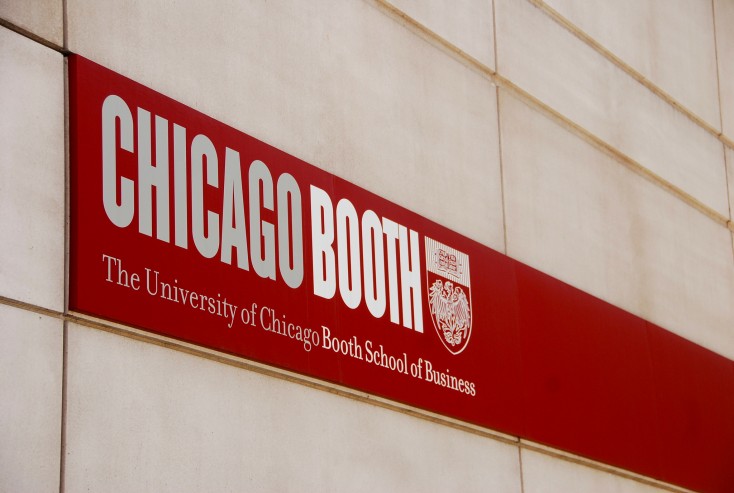 Many business school blog posts offer interview tips from the admissions committee’s point of view. But a new post from the Booth Experience Team at the Chicago Booth School of Business shares feedback straight from the Admissions Fellows who have or will soon conduct interviews with those lucky Round 1 applicants. Through a series of Do’s and Don’ts from the Admissions Fellows, a few common threads emerge within their interview advice for Chicago Booth. Namely:
Interview Advice for Chicago Booth  DO research your interviewer. “It’s so easy to take 5 minutes looking at your interviewer’s LinkedIn profile, and it showed that applicants had taken time to personalize the conversation.” DO seize every opportunity to bolster your candidacy. “Be sure to add anything else you want to share after the formal questions are completed. It’s helpful when there are specific things that you want Admissions Fellow interviewers to highlight in their feedback on you. Help them help you by highlighting the most exciting aspects of your application and background.” DO show how you will add to the Booth community. “All interviewers are looking to understand how you will succeed at Booth and a big portion of that is by how you will become involved. Have specific industry experience that will allow you to take a leadership role within a Student Group at Booth? Make sure you’ve expressed this to your interviewer so they can help envision your future at Booth.”  DON’T ramble. “Keep your talking points organized and tight. The best candidates often presented their answers using three crisp points or by using a “STAR”-esq framework (STAR being: Situation, Task, Action, Result).” DON’T read from notes. If your interview takes place virtually, avoid reading from off-camera notes. “Don’t be the candidate that is reading a rehearsed answer. While we do encourage you to practice your answers to typical interview questions out loud, make sure you’re not sounding too robotic.” DON’T be generic. “If you’re asked ‘Why Booth?’ you need to very specific. Name drop a few specific courses that you plan to take [and] make sure to reference a few of the traditions like ‘Random Walk.’ Every business school has their way of calling specific programs or groups, so make sure you’re using Booth’s specific terminology.” *** Did you know that Stacy Blackman Consulting produces interview guides for many of the top MBA programs? Check out our Chicago Booth Interview Guide, a comprehensive resource to help you prepare. You have access to real interview transcripts, prep exercises, and sample answers and analyses for common interview questions. Get yours today and start prepping to rock your Booth interview! The post Interview Advice for Chicago Booth appeared first on Stacy Blackman Consulting - MBA Admissions Consulting. |
| FROM Stacy Blackman Consulting Blog: SBC Named 2023’s Best Admissions Consultant by MBA Insight |
 For the third year in a row, Stacy Blackman Consulting is honored to receive the top ranking in MBA Insight’s 2023 Best MBA Admissions Consultants list. To compile its comprehensive assessment, MBA Insight reviews extensive student testimonials. They take into account each student review and how they rated their MBA admissions consultant using a 1-to-5-star rating system. MBA Insight’s 2023 Consultant Ranking Here are just a few highlights and notable characteristics of MBA Insight’s admissions consultant rankings:
This evaluative tool can help you assess the value of an MBA admissions partner for your journey. Here are our most frequently asked questions, ranging from “can you get me into HBS” to “why should I hire SBC?” Testimonial from an MBA Class of 2023 admit: “Before deciding to go forward with SBC, I had initial talks with numerous other consulting firms. SBC stood out because of the matchmaking process, the entire team’s efforts toward your final application (through their helpful flight test), and their resources. I received interviews at 5 of the 6 schools I had applied for, and the SBC interview resources helped tremendously with my interview preparation. In addition, I’d like to add that the team at SBC was genuinely so kind and it really felt like they were on my side in this process. I had lots of ups and downs while applying (personally and professionally!) and the team continued to be there to cheer me on and push me forward. I ultimately got accepted to my dream school and cannot recommend SBC enough!” While scholarships for MBA programs are notoriously slim compared to other graduate programs, we continue to see an annual increase of about 10% in scholarship awards for our clients. In fact, about 20-25% of SBC clients receive scholarship packages ranging between $10,000 to full-ride offers valued at $200,000. We’re on a mission to help you reach your most ambitious dreams and get into business school. Let us help you develop your game plan! Contact us today to request a complimentary 15-minute evaluation of your MBA candidacy. The post SBC Named 2023’s Best Admissions Consultant by MBA Insight appeared first on Stacy Blackman Consulting - MBA Admissions Consulting. |
| FROM Stacy Blackman Consulting Blog: B-Schooled Podcast Episode #130: 6 Things You Think You Know About MBA Essay Writing (But Might Not) |
 We all know how to write, so what could possibly go wrong in an MBA application essay? Lots of things, as it turns out. In this B-Schooled podcast, we dive into six tips for MBA essay writing that even the most confident writers sometimes miss. This will include the following: • Directly answering the question asked • The active vs. the passive voice • Writing an attention-grabbing first (and last) sentence • The STAR format and why it is your friend • Structuring your essay clearly • Writing in a way that is clear, simple, and concise Even if you think you have everything covered for your essays, be sure to give this podcast a listen. This B-Schooled episode can be found here, or take a listen on any of the major podcast platforms below. B-Schooled is available on most major podcast apps, including: Apple Podcasts Spotify Stitcher TuneIn Please be sure to subscribe to B-Schooled so that you don’t miss a thing. Also, if there’s something you’d like for us to cover in a future episode, please email podcast@stacyblackman.com. We’d love to hear from you! The post B-Schooled Podcast Episode #130: 6 Things You Think You Know About MBA Essay Writing (But Might Not) appeared first on Stacy Blackman Consulting - MBA Admissions Consulting. |
| FROM Stacy Blackman Consulting Blog: Harvard Business School Acceptance Rate, Deconstructed |
|
[img]https://www.stacyblackman.com/wp-content/uploads/HBS-Harvard-Business-School-Baker_library-cropped-734x430.jpg[/img] The Harvard Business School acceptance rate in 2021 was the third-lowest of all MBA programs worldwide, just a hair’s breadth behind MIT Sloan School of Management. HBS is typically eclipsed by the single-digit rate of Stanford GSB, partly because the GSB has a much smaller class size—1,222 admits vs. 455. Earlier this year, Poets & Quants shared acceptance rate and yield data for the [url=https://poetsandquants.com/2022/04/02/the-window-closes-acceptance-rates-at-the-top-50-u-s-mba-programs/2/]top US MBA[/url] programs. Here, you can plainly see the strength that HBS has in attracting applicants and students. HBS’s acceptance rate in 2021 was 12.5%, up from 11.5% a year earlier (MIT Sloan was 12.1%). To help demystify the Harvard Business School acceptance rate drivers, we decided to evaluate SBC’s recent client data. Our findings show that the admit patterns by HBS have become increasingly reliant on qualitative aspects, in addition to application essay strength and a broader range of demonstrated applicant attributes. Indeed, an applicant’s personal narrative is often the most influential factor in the admissions decision process. It can be even more predictive of admissions success than rigid categories such as college type, test score, or employer. Discussing motivations, life lessons, setbacks, growth, doubts, and realizations are all ways to show a depth of character. When you do this, you activate the holistic and multi-faceted admissions criteria that HBS has come to value. Recent SBC Clients Admitted to HBS To preserve anonymity for our client pool, we’ve deconstructed each of our client profiles across these criteria: nationality, industry, employer, college, GPA, test score, and other distinguishing factors. Our consultants have shared client attributes for each of these criteria. We’ve aggregated the outcomes for HBS admits according to personal, extracurricular, and professional domains. These visuals showcase the kaleidoscope of qualities found in HBS admits across a sampling of recent SBC clients. [img]https://www.stacyblackman.com/wp-content/uploads/Work-word-bank-685x734.png[/img] [img]https://www.stacyblackman.com/wp-content/uploads/Community-word-bank-711x734.png[/img] [img]https://www.stacyblackman.com/wp-content/uploads/personal-word-bank.png[/img] Overcoming the Harvard Business School Acceptance Rate Odds In deconstructing the success factors for our HBS admits, we have seen that highlighting personal qualities and triumphs is essential. Our review concluded that neither past academic background nor test scores could reliably predict whether candidates got admitted or rejected. Furthermore, success appeared linked to how “interesting” the candidate appeared to admissions officers. Applicants conveyed this through both their overarching story and positioning as well as execution through detailed anecdotes and nuances. Life interests, values, and personal identity are critical influencers for the HBS admissions process and essential to overcoming the challenging HBS acceptance rate odds. As a recent [url=https://www.stacyblackman.com/comprehensive-services/]All-In package[/url] client and now HBS admit shared, “Don’t underestimate yourself or compare yourself to others too much. Recognize that your values, your lived experiences, and your interests are what make you YOU. Focus on letting that shine through your application. And definitely don’t NOT apply because you feel like you’re not qualified enough. Do not let the competition scare you. Just focus on what you can control— building and communicating the strongest application you can.” Check out our HBS and GSB dual admit study [url=https://www.stacyblackman.com/stanford-harvard-business-school-mba-applications-double-admits/]here[/url] for more inspiration. If you’d like to speak with one of our Principals about your MBA candidacy, please [url=https://www.stacyblackman.com/contact/]request a free analysis here[/url]. The post [url=https://www.stacyblackman.com/blog/harvard-business-school-acceptance-rate-deconstructed/]Harvard Business School Acceptance Rate, Deconstructed[/url] appeared first on [url=https://www.stacyblackman.com]Stacy Blackman Consulting - MBA Admissions Consulting[/url]. |
| FROM Stacy Blackman Consulting Blog: Stanford MBA Acceptance Rate, Deconstructed |
|
[img]https://www.stacyblackman.com/wp-content/uploads/Stanford-GBS-Knight-Management-Center-734x486.jpg[/img] Despite the upheaval triggered by the pandemic, the Stanford Graduate School of Business continues to hold massive appeal for applicants. Stanford GSB is the most competitive MBA program in the world. Just how hard is it to get into the GSB? Well, the Stanford MBA acceptance rate in 2021 was just 6.2% of applicants. The school also recorded its highest yield level ever, with 93.6% of admits, up from 82.3% the year prior, according to [url=https://poetsandquants.com/2022/04/02/the-window-closes-acceptance-rates-at-the-top-50-u-s-mba-programs/]Poets & Quants[/url]. Unlike large programs such as Harvard Business School, Stanford’s smaller size (1,222 vs. 455 in the MBA Class of 2023) means it simply can’t admit as many students. As we shared with [url=https://find-mba.com/articles/how-to-get-into-stanford-mba-admissions-consultant-stacy-blackman-discusses]Find MBA[/url], Stanford’s brand reputation is rock-solid, and much of the demand is driven by its location close to the tech capital of the world. To help demystify the Stanford MBA acceptance rate drivers, we decided to evaluate SBC client data from recent seasons. Our findings show that the admit patterns by Stanford GSB have become increasingly reliant on qualitative aspects, in addition to application essay strength and a broader range of applicant attributes. (This also held true for the retrospective analysis we did for [url=https://www.stacyblackman.com/harvard-business-school-acceptance-rate-deconstructed/]HBS admits[/url].) An applicant’s personal narrative is often the most influential factor in the admissions decision process at Stanford GSB. It can be even more predictive of admissions success than rigid categories such as college type, test score, or employer. [b]Our process:[/b] To preserve anonymity for our client pool, we’ve deconstructed each of our client profiles across these criteria: [list] [*]Nationality[/*] [*]Industry[/*] [*]Employer[/*] [*]College[/*] [*]GPA[/*] [*]Test scores[/*] [*]Other distinguishing factors[/*] [/list] Our consultants have shared client attributes for each of these criteria, and we’ve aggregated the outcomes for the GSB admits according to personal, extracurricular, and professional domains. These visuals showcase the kaleidoscope of qualities found in Stanford GSB admits across a sampling of recent SBC clients. [img]https://www.stacyblackman.com/wp-content/uploads/Stanford-MBA-Acceptance-Rate.png[/img] [img]https://www.stacyblackman.com/wp-content/uploads/Stanford-MBA-Acceptance-Rate-Personal.png[/img] [img]https://www.stacyblackman.com/wp-content/uploads/Screen-Shot-2021-11-03-at-6.01.45-PM.png[/img] Overcoming the Stanford MBA Acceptance Rate Odds We asked the former Stanford GSB Admissions Officers on our [url=https://www.stacyblackman.com/about/mba-admissions-consulting-team/]Stacy Blackman Consulting team[/url], “What does Stanford GSB Admissions look for?” Here’s the consensus: Stanford GSB seeks talented, diverse, and smart people who will make a significant impact in business and society. Stanford GSB students seem to have this ‘X’ factor associated with them, almost like an “unexpected” trait or experience. They take risks, push beyond the imaginable and lead with passion. [img]https://www.stacyblackman.com/wp-content/uploads/Stanford-GSB-Knight_Management_Center-734x488.jpg[/img] We asked these same former Stanford GSB Admissions Officers, “What does Stanford GSB Admissions want to avoid?” Their answer: People who are looking at an MBA as merely the expected step in getting credentials for their next job in a corporate/firm ladder and/or the hyper-competitive types. The former GSB AdCom team at Stacy Blackman Consulting added: GSB’s smaller size means that it is more conscious of class balance and diversity. GSB is more willing to consider candidates that took risks, failed, learned from their experiences, and returned more resilient than ever. First-Hand Feedback from a GSB Admit As a recent [url=https://www.stacyblackman.com/comprehensive-services/]All-In package[/url] client and now GSB admit shared, “The GSB is choosing [url=https://www.stacyblackman.com/guides/strategy/stanford/]a range of people to invest in[/url] because of their future potential to change the world. Perhaps they’ve already shown a history of doing so, but other times they haven’t. Instead, those applicants show a promising trajectory that they’ll get there in the future. Stanford cares a LOT that students have a genuine interest in making some larger, positive, social impact on the world. Yes, the point of business school is for your own career advancement. But GSB wants that career advancement to amount to broader social advancement, too.” She adds, “Maturity and self-awareness are key! Ultimately, your experiences probably aren’t that unique, given the huge number of applications programs will get every year. But it’s how you frame them, reflect on them, and use them to showcase yourself that will set you apart from others.” [url=https://www.stacyblackman.com/contact/]Request a free consultation[/url] with a Principal on our team to assess school fit and Stanford GSB admit odds. The post [url=https://www.stacyblackman.com/blog/stanford-mba-acceptance-rate-deconstructed/]Stanford MBA Acceptance Rate, Deconstructed[/url] appeared first on [url=https://www.stacyblackman.com]Stacy Blackman Consulting - MBA Admissions Consulting[/url]. |

|
|